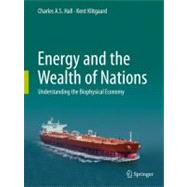Energy and the Wealth of Nations : Understanding the Biophysical Economy
, by Hall, Charles A. S.; Klitgaard, Kent A.- ISBN: 9781441993977 | 1441993975
- Cover: Hardcover
- Copyright: 10/26/2011
For the past 150 years, economics has been treated as a social science in which economies are modeled as a circular flow of income between producers and consumers. In this "perpetual motion" of interactions between firms that produce and households that consume, little or no accounting is given of the flow of energy and materials from the environment and back again; in the standard economic model, energy and matter are completely recycled in these transactions and economic activity is seemingly exempt from the second law of thermodynamics . As we enter the second half of the age of oil, and as energy supplies and the environmental impacts of energy production and consumption become major issues on the world stage, this exemption appears illusory at best. Why are economics and energy still studied and taught separately when all forms of economic production involve the transformation of materials, which in turn requires energy? The answer probably lies in the recent era of cheap and seemingly limitless fossil energy. Without energy or other resource constraints, the rate-determining step in any economic transaction became the choice of insatiable humans attempting to get maximum psychological satisfaction from the money at their disposal, and markets appeared to have an infinite capacity to serve these needs and wants. However, "the end of cheap oil," as Campbell and Laherrere put it, is a game changer, and it is again time to ask why economics should be a social science when it is about the production, transportation and consumption of things, all of which is embedded in the biophysical world, dependent on the use of energy, and results in environmental impacts on local and global scales. Peak oil, the concept that world oil production has reached a maximum and will enter terminal decline, is now a reality (e.g., U.S. Energy Information Administration, 2009), and we must revise our economic assumptions.In Energy and the Economy, concepts such as energy return on investment (EROI) provide powerful insights into the real balance sheets that drive our energy economy. Hall and Klitgaard explore the relation between energy and the wealth explosion of the 20th century, the failure of markets to recognize or efficiently allocate diminishing resources, the economic consequences of peak oil, the EROI for finding and exploiting new oil fields, and whether alternative energy technologies such as wind and solar power meet the minimum EROI requirements needed to run our society as we know it. This book is an essential read for all scientists and economists who have recognized the urgent need for a more scientific, unified approach to economics in an energy-constrained world, and serves as an ideal teaching text for the growing number of courses, such as the authors#xE2;#xAC;" own, on the role of energy in society.






